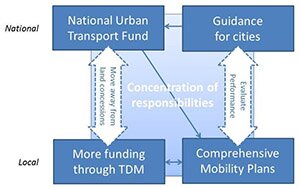How to finance Sustainable Urban Transport was the main question during the 3-days workshop Prospects for National-Level Programmes and Funds for Sustainable Urban Transport in China. From 1st to 3rd of November 2012 GIZ, EMBARQ and SLOCAT in cooperation with CUSTReC jointly conducted this international expert workshop.
Download here:
Interactive discussions showed that funding of sustainable urban transport in China needs to be addressed in a comprehensive manner. Improving the actual funding will need to go hand in hand with institutional reforms at both the national and the local level. Some big cities in China have already started implementing sustainable transport infrastructure schemes as well as sustainable transport related policies and measures. At the same time other (mostly smaller) cities still lack the capacity and financial resources to improve their sustainable transport systems and policies. Therefore, China is facing two important questions in financing urban transport:
- What can and should the national government do to establish conditions allowing a sustainable development of transportation in Chinese cities?
- How can an institutional system be developed that promotes a more sustainable development of urban transport systems and is economically sustainable at the same time , i.e. what are suitable procedures and criteria for national-level funding of urban transport (construction, maintenance and operation)?
To address these two questions the workshop aimed to gain a better understanding of current institutional and financial arrangements in China for (sustainable) urban transport and learn from international experiences. The key focus was on the development of specific recommendations for the Chinese situation and funding practice. Workshop participants identified the following three building blocks to improve financial flows into sustainable urban transport:
- Combining national-local sustainable funding mechanisms. Workshop participants suggest creating a Chinese National Urban Low Carbon Transport Fund and improve local value capture.
- Applying a comprehensive approach to integrated planning. Focusing currently scattered national and provincial policy guidance into a national urban transport policy and introducing performance-based funding.
- Coordination of institutions within and between cities. Comprehensive mobility plans can be coordinated by setting up regional transport authorities or associations with the capacity to plan, develop, and oversee all components of the transport system.
Further informations about the Sino-German Climate Change Programme and the factsheets of the workshop can be found here.




One thought on “Final Workshop Summary Report on Financing Sustainable Urban Transport”